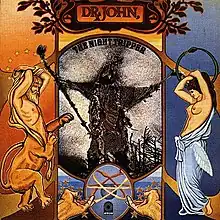| The Sun, Moon & Herbs | ||||
|---|---|---|---|---|
 | ||||
| Studio album by | ||||
| Released | August 31, 1971 | |||
| Recorded | July – October 1970 | |||
| Studio | Trident Studios, London Criteria Studios, Miami FL Dimension Recorders, Hollywood, California | |||
| Length | 38:59 | |||
| Label | Atlantic | |||
| Producer | Mac Rebennack, Charles Greene | |||
| Dr. John chronology | ||||
| ||||
| Review scores | |
|---|---|
| Source | Rating |
| AllMusic | |
| Christgau's Record Guide | C+[2] |
| Rolling Stone | (mixed)[3] |
The Sun, Moon & Herbs is a 1971 studio album by New Orleans R&B artist Dr. John, noted for its contributions from Eric Clapton, Mick Jagger, and other well-known musicians. It was originally intended to be a three-album set but was cut down to a single disc.[4] The album was described by James Chrispell on AllMusic as "dark and swampy" and "best listened to on a hot, muggy night with the sound of thunder rumbling off in the distance like jungle drums".[1] The album was Dr. John's first album to reach the Billboard 200 charts, spending five weeks there and peaking at #184 on November 6, 1971.[5]
Track listing
All tracks are written by Mac Rebennack except where noted
| No. | Title | Length |
|---|---|---|
| 1. | "Black John the Conqueror" | 6:20 |
| 2. | "Where Ya at Mule" | 4:56 |
| 3. | "Craney Crow" | 6:40 |
| No. | Title | Writer(s) | Length |
|---|---|---|---|
| 1. | "Familiar Reality (Opening)" | Rebennack, Jesse Hill | 5:25 |
| 2. | "Pots on Fiyo (Filé Gumbo) / Who I Got to Fall On (If the Pot Get Heavy)" | 5:48 | |
| 3. | "Zu Zu Mamou" | 7:57 | |
| 4. | "Familiar Reality (Reprise)" | Rebennack, Jesse Hill | 1:53 |
Personnel
Musicians
- Dr. John – vocals, piano, organ, guitar, vibes, percussion
- Tommy Ferrone – rhythm guitar
- John Boudreaux – drums
The Memphis Horns
- Andrew Love – tenor saxophone
- Jack Hale, Sr. – trombone
- James Mitchell – baritone saxophone
- Ed Logan – tenor saxophone
- Roger Hopps – trumpet
- Wayne Jackson – trumpet, horn
(tracks 1, 2, 5)
Guest musicians
- Eric Clapton – slide guitar
- Ronnie Barron – keyboards (track 4)
- Graham Bond – alto saxophone (track 1)
- Steve York – acoustic bass (tracks 5, 6)
- Jesse Boyce – bass (track 3), percussion (track 6)
- Carl Radle – Fender bass (tracks 2, 7)
- Ron Johnson – bass (track 4)
- Walter Davis Jr. – piano (tracks 1, 3, 5)
- Jim Gordon – percussion, conga (tracks 2, 7)
- Vic Brox – pocket trumpet & organ
- Ray Draper – tuba, percussion & background vocals
- Chris Mercer – saxophone (tracks 1, 2, 7)
- Jerry Jumonville – saxophone (track 4)
- Bobby Keys – tenor saxophone (tracks 2, 7)
- Jim Price – trumpet (tracks 5, 7)
- Edward R. Hoerner – trumpet (track 4)
- Kenneth Terroade – flute (tracks 1, 3, 5, 6)
- Calvin "Fuzzy" Samuels – percussion (track 5)
- Freeman Brown – percussion (track 3, 5, 6)
- Freddie Staehle – trap drums
- Mick Jagger (track 2), Doris Troy, Shirley Goodman, Tami Lynn, P. P. Arnold, Bobby Whitlock, Joni Jonz – backing vocals
Technical
- Dr. John – producer, arranger
- Charles Greene – producer
- Roy Thomas Baker – engineer
- Juddy Phillips – engineer (track 4)
- Albhy Galuten, Tom Dowd – remix engineers
- Howard Albert, Karl Richardson, Ron Albert – overdub engineers
- John Millerburg – design concept
- Gary Burgess – photography
References
- 1 2 Chrispell, James. "The Sun, Moon & Herbs – Dr. John at AllMusic. Retrieved March 10, 2008.
- ↑ Christgau, Robert (1981). "Consumer Guide '70s: D". Christgau's Record Guide: Rock Albums of the Seventies. Ticknor & Fields. ISBN 089919026X. Retrieved February 24, 2019 – via robertchristgau.com.
- ↑ Crouse, Tim (October 28, 1971). "Dr. John: The Sun Moon & Herbs". Rolling Stone. Straight Arrow. ISSN 0035-791X. Retrieved March 10, 2008.
- ↑ Dr John Album History
- ↑ "Billboard 200 – November 6, 1971". Billboard. Retrieved July 21, 2017.
This article is issued from Wikipedia. The text is licensed under Creative Commons - Attribution - Sharealike. Additional terms may apply for the media files.